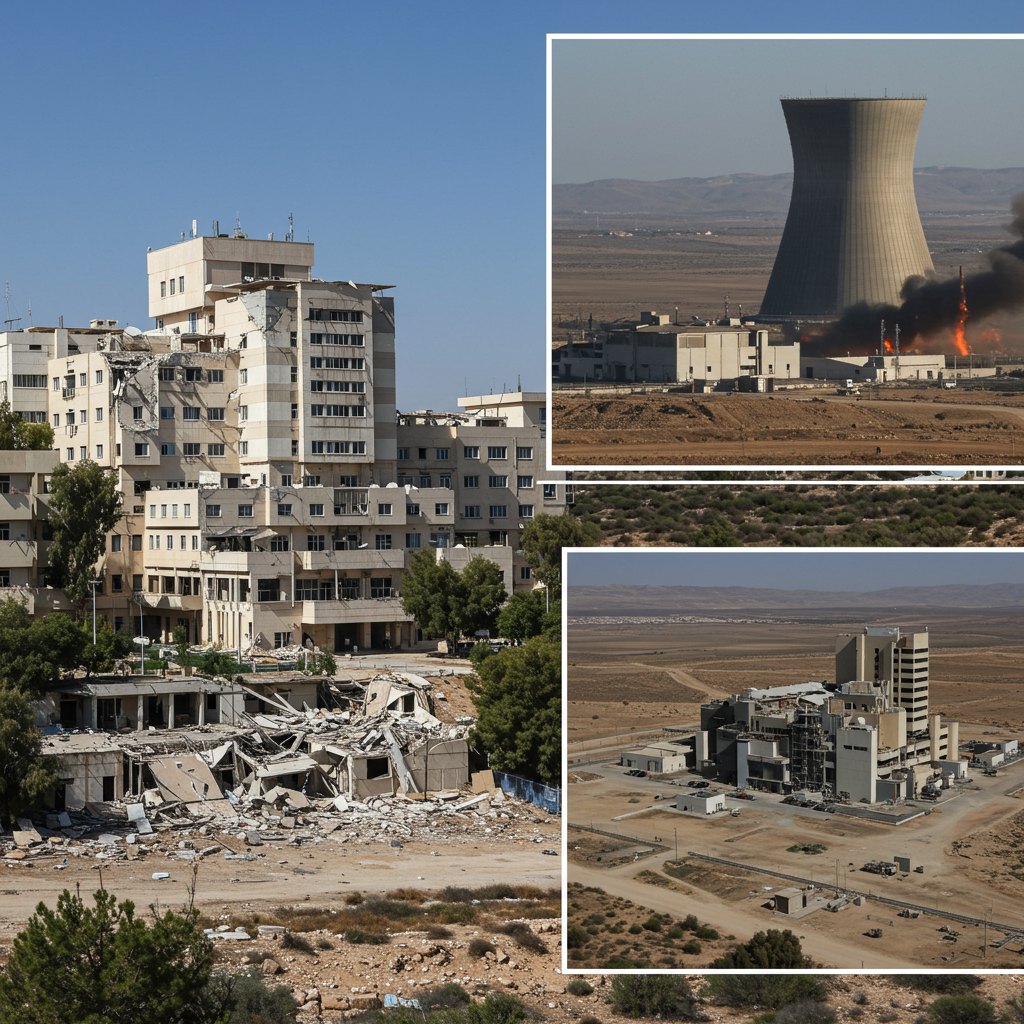Israel-Iran Conflict Escalates with Reciprocal Strikes on Key Sites
The direct military exchange between Israel and Iran intensified dramatically on the seventh consecutive day of conflict, marked by significant missile strikes targeting civilian areas in Israel and retaliatory Israeli attacks focusing on Iran’s nuclear infrastructure. The escalation highlights the broadening scope of the conflict, previously limited primarily to military and strategic targets.
Iranian Missiles Target Israeli Cities, Hit Hospital
A major development saw Iran launch a substantial missile barrage across Israel. The Soroka Medical Center, the largest hospital serving southern Israel in Beersheba, sustained significant damage. Reports indicated an Iranian missile directly hit the facility, causing “extensive damage,” particularly to the surgical ward, with blown-out windows and heavy smoke.
Hundreds of people were wounded across Israel during the barrage, with at least 240 injured according to Israel’s Ministry of Health. While most injuries were light, attributed in part to many patients being moved to safer, underground areas of hospitals under emergency protocols, several dozen were injured at Soroka, with some described as seriously hurt. Beyond Beersheba, Iranian projectiles also struck other sites, including a high-rise apartment building in Tel Aviv and areas in central Israel.
Iran, however, presented a different account regarding the Beersheba strike. Officials claimed their primary targets in the area were large Israeli Army Command and Intelligence (IDF C4I) headquarters and a military intelligence camp in the nearby Gav-Yam Technology Park. They asserted that the Soroka hospital suffered only minor damage as a result of the shockwave from these intended military strikes.
Israel Targets Iran’s Nuclear Program, Strikes Arak Reactor
In swift response to the Iranian attacks, Israeli fighter jets conducted extensive strikes on numerous sites within Iran. A key target explicitly named by the Israeli military was the Arak heavy water nuclear reactor (also known as Khondab). Israel stated it specifically targeted “the structure of the reactor’s core seal,” a critical component, with the stated aim of preventing plutonium production necessary for potential nuclear weapons development and hindering the reactor’s future use.
Iranian state media confirmed that air defenses were activated near Khondab and reported two projectiles impacting an area close to the facility. Both Iranian officials and the International Atomic Energy Agency (IAEA) confirmed the Arak reactor was hit. The IAEA clarified that the reactor was not operational and contained no nuclear material at the time, posing no radiological risk. Iran also reported that the facility had been evacuated prior to the strikes and stated there was “no radiation danger whatsoever.” Israel also indicated it had issued warnings via social media for the public to leave the area around the facility before carrying out the strike.
Israeli strikes targeted dozens of other sites as part of “Operation Rising Lion,” their ongoing campaign against Iran’s capabilities. These included other nuclear-related facilities near Natanz, radar systems, missile storage and production sites, centrifuge production sites vital for uranium enrichment, and military command centers. Israel also claimed strikes in the Tehran area, including weapon production sites and potentially the building of Iran’s state broadcaster, where Iranian officials reported employee fatalities earlier in the week. An Israeli military official claimed these strikes had significantly damaged Iran’s ballistic missile launcher capability, estimating two-thirds had been destroyed.
Escalation and Heightened Tensions
The exchange followed an earlier Israeli attack a week prior which reportedly killed senior Iranian military officials and nuclear scientists, and Iran’s initial large-scale missile and drone response which saw hundreds of projectiles launched at Israel, most of which were intercepted.
Leaders on both sides issued strong warnings following the latest strikes. Israeli Prime Minister Benjamin Netanyahu vowed that Iran would pay “a heavy price” or “exact the full price” for targeting civilians and a hospital. Defense Minister Israel Katz went further, calling the hospital strike a “war crime of the most serious kind,” holding Supreme Leader Ayatollah Ali Khamenei accountable, and stating that he and Netanyahu had instructed the military to intensify strikes against strategic and regime targets in Iran and Tehran. Katz also made highly inflammatory remarks regarding Khamenei’s continued existence.
Casualty figures from the ongoing conflict paint a grim picture. A Washington-based Iranian human rights group reported at least 639 deaths in Iran over the past week from Israeli air strikes, including over 260 civilians. Meanwhile, Israeli retaliatory strikes have resulted in dozens of deaths and hundreds of injuries. Overall, reports indicate Iran has fired approximately 450 missiles and 1,000 drones towards Israel since the conflict began.
International Response
The escalating conflict drew swift international attention and concern. The United Nations Security Council was set to hold an emergency session, while the UN Secretary-General called for immediate de-escalation and a ceasefire, warning against the internationalization of the conflict and condemning civilian casualties.
Major powers expressed alarm, with European nations pursuing diplomatic avenues, including planned talks with Iran’s Foreign Minister in Geneva. The United States, while issuing security alerts and evacuating nonessential personnel from Israel, indicated its close involvement and President Trump reiterated the US stance against Iran acquiring nuclear weapons, stating he was considering the extent of potential US military action while maintaining that Iran was “defenseless.” Russia and China both voiced condemnation of the Israeli attacks, calling for the situation to be resolved through political and diplomatic means and warning against further military escalation, particularly involving the US.




